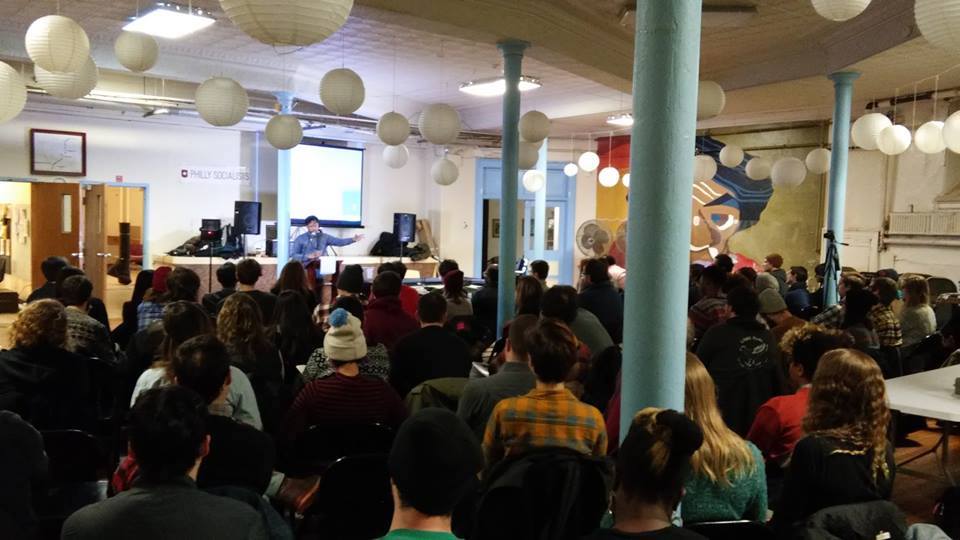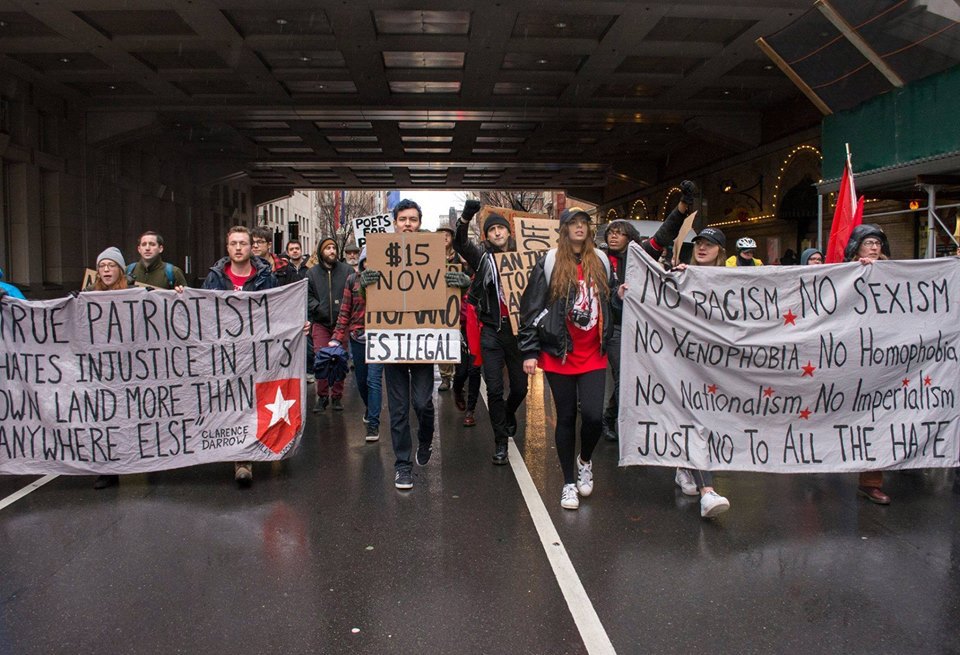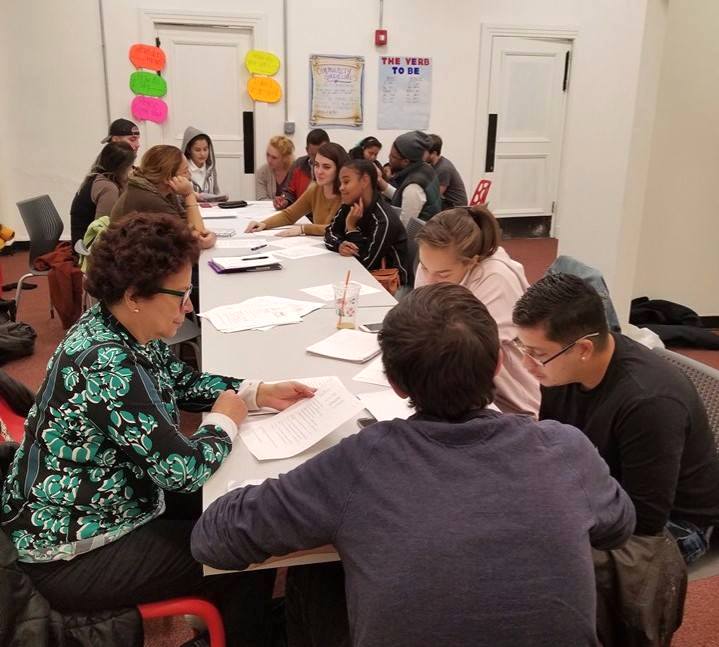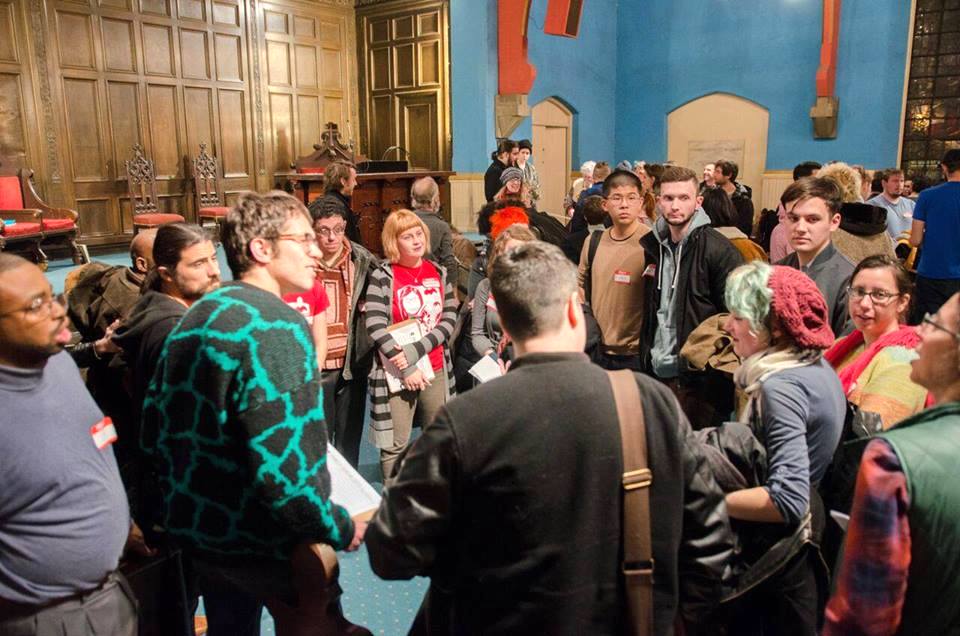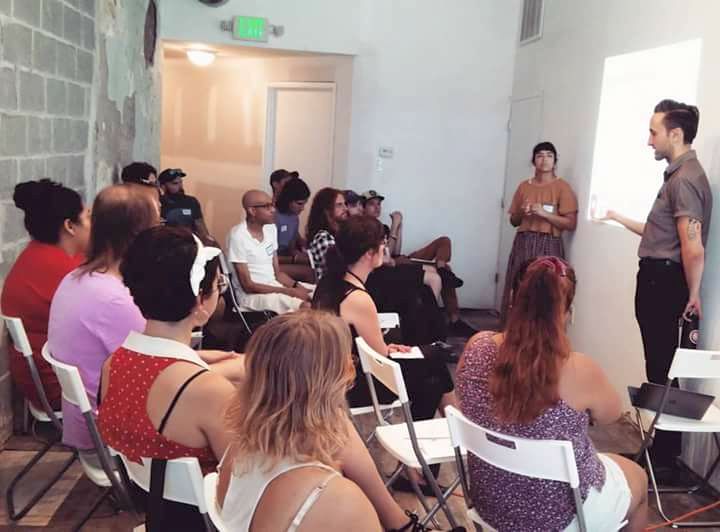Meet Philly Socialists, the activist group organizing for a more just political system
 February 1, 2018
Category: Column, Featured, Long, Purpose
February 1, 2018
Category: Column, Featured, Long, Purpose
Cool Things Wit Cool People is a monthly column by Akeem Dixon focusing on community development. To ask a question, email coolthingswitcoolpeople@gmail.com, or reach out @akeemdixon.
A new year means so much to so many of us.
It can offer a clean canvas to paint our wildest dreams and hopeful new beginnings, and a chance to try something new and challenge yourself to infuse something exciting and rewarding into your life.
For community development-centric folks, the new year brings a new opportunity to devote time, energy and passion to implementing innovative ideas that make their little piece of the world a better place — something that for many has been even more of a priority since 2016, with Donald Trump’s election and the call for social justice reaching deafening volumes.
Philly Socialists, founded in 2011, offers a home for doers to unite and take on community-related issues with the goal of empowering its members to change the systems we exist in as Americans — a complicated task that this group tackles head on by learning (its members hope) from the mistakes made by our current political and economic systems.
I’d heard socialism was rising in popularity across the country, including in Philadelphia and especially among young people. So, in the spirit of the new year, I decided to learn more. Here, Director of Communications and Design Andrew Joung walks us through Philly Socialists 101: what it is, who it represents, what it’s accomplished and what’s next.
AD: What is Philly Socialists and what is the group’s purpose?
AJ: Philly Socialists is a multi-tendency, socialist base-building organization. That’s a mouthful, so let me try and break-down what that means. We are, first and foremost, socialists. That means that we believe that the fundamental root of our society’s problem is capitalism and solving the most important issues of today (e.g., police brutality, mass incarceration, poverty, homelessness) cannot be solved by directly dealing with a system that organizes itself around profit rather than need.
But unlike a lot of other socialist organizations, we are not centered on theory. What that means for us is that we are driven by ideas that work, not an attachment to a specific socialist dogma. We pull from the best aspects of three great socialist traditions: social democracy, anarchism and communism. We believe above all that a respect for difference in experience and thought is absolutely essential.
[Editor’s note: One other local socialist group is Democratic Socialists of America, a national group with a Philly chapter.]
AD: Does your group think of itself as a community development organization? How so, or why not?
AJ: I think that depends on what you mean. We want to empower our communities to have what we call an independent power. That means, we want our communities to have power independent from the electoral cycle (e.g., more political power than the vote) and the State.
Base-building is about establishing a vast foundation of active and skilled political agents. Fundamentally, we are trying to not only overturn the existing relations of society, but establish a set of organizing practices that will allow us to teach people how to govern society.
We are not here to fix people’s problems for them. This goes back to base-building: We are interested in building people’s capacity to self-organize and develop their own communities. We look to organizations like Cooperation Jackson, a group of socialist, Black Nationalists who won the mayoral seat in Jackson, MI — twice! Their vision includes things like cooperative incubators, where the city would help train and offer starting capital to people interested in starting cooperatives.
Of course, there are somethings that the community by itself cannot do. BUT, insofar as we can, we want to return the power to develop back into the hands of the community. If that’s your definition of a community development organization, then that’s what we are.
AD: What separates Philly Socialists from other groups or political parties? For that matter, is it a group, party, meetup?
AJ: We are definitely not a party or meetup, so maybe something in-between? We don’t worry ourselves with those kinds of classifications because the work is what matters, and you don’t need to call yourself a “party” or a “club” to do the work.
What differentiates us is that we are socialist, multi-tendency, and focused on base-building. In Philly Socialists, we put a lot of energy and time into developing a structure that allows us to involve people who normally would not be involved in activism. For example, a lot of organizations are structured so that most of the important tasks are done by either paid organizers or the most “committed” (i.e., willing to put in a substantial amount of time). We believe that every single person can play a role.
Philly Socialists has a core group of activists who dedicate a large amount of time to make this organization function. BUT it could not exist without people who volunteer every few weeks to do a flyering run, collect signatures, or come to a protest. Philly Socialists exists based on the sum total of $10 and a couple hours a month from each of our members.
AD: Philly Socialists have been able to work with City Council on a major renters initiative. Can you explain the Philadelphia Tenants Union, its relationship with Philly Socialists, and detail how you were able to get City Council to work with you?
AJ: The Philadelphia Tenants Union (PTU) definitely deserves all of the credit for that work. The role of Philly Socialists was as a close, close coalition partner but fundamentally we served a subordinate role in that struggle.
With regard to the relationship between Philly Socialists and the PTU — we started it and have many overlapping members with the PTU, and we give them money every month, but that’s about where our relationship ends. The PTU has complete autonomy and many of its members are not members of Philly Socialists. The lines are pretty clear cut.
The PTU had a two-fold strategy: tackling individual tenant/landlord struggles and pushing for Just Cause (now known as “Good Cause”). Tackling individual tenant/landlord struggles is the meat-and-potatoes and is what built the PTU’s capacity. Many of our best organizers in the PTU are the tenants we fought for. Moreover, these fights pulled outside supporters into membership and trained organizers to become even better, more militant organizers.
Alongside the consistent tackling of individual tenant/landlord struggles, the PTU also began a legislative campaign for Good Cause legislation. Good Cause simply establishes that it should be illegal for a landlord to evict someone without any reason. The PTU tried to reach out to nearly every tenants’ rights group in the city and was told that this was an impossible goal because of the strength of real-estate lobby.
After a series of fights, the PTU hit a big one — Penn Wynn. It got a lot of news coverage since more than 60 residents were at risk of mass eviction with no cause. From that fight, we found new organizers and the attention of city council.
To some it might look like what wins reforms are big flashy fights. That’s true in a way, but it obscures the fact that there is no way the PTU could’ve tackled that large of a fight without having built an organization and trained organizers through the regular experience of tackling much smaller fights. There’s no way the PTU could exercise any control over how the law is being written if they didn’t have really smart and dedicated people overseeing the entire operation, if they didn’t regularly demonstrate that they have a social base in communities.
AD: How have you seen local attitudes toward socialism change since Trump was elected?
AJ: A lot of attitudes have shifted. I think that, first, a whole other layer of people are now getting involved in politics. For a lot of people, they find this problematic: Why is this layer of people getting involved now, when things like Occupy and #BlackLivesMatter have rocked this nation? No one is perfect politically. People arrive to their politics at different times. This isn’t to say we shouldn’t be critical. Philly Socialists went out to the Women’s March to flyer, but endorsed a statement written by a series of organizations that critiqued the Women’s March for collaborating with police. A lot of people are ready to finally do something, anything.
Trump also helped accelerate some of the lessons learned from the Bernie Sanders campaign. The Sanders campaign taught a lot of people that Democratic Party is deeply corrupt. Trump coming into presidency demonstrated that they are also deeply incompetent.
But I also think that a lot of attitudes haven’t changed that need to change. People are still in the mindset that a narrowly electoral strategy can carry us to liberation. Also, sadly, people are not turning out in the numbers that they used to. In Philly Socialists, a lot of us were surprised how quickly the “Trump bump” dissipated.
AD: An office space was recently opened at 2341 N. Front Street in Kensington. What is the goal and purpose of the space?
AJ: Logistically, we are too big and doing too much to have all of our stuff scattered among our various homes. We are also constantly hosting meetings, so having a dedicated meeting space is a major plus.
Politically, we believe that having an office is a major first step to establishing a public face for the community. We want people to be able to associate us with a space, since that can make an amorphous network of people suddenly seem like an organization. We are really serious about presenting ourselves as a dedicated and professional organization.
AD: Equality, inclusion and diverse are goals that groups strive for and something that has been uttered more than the Nike Slogan “Just Do It” in the recent months. How does Philly Socialists accomplish this and create a safe space for various groups (race, gender, etc.)? Or is this something that you struggle this as well?
AJ: We, of course, struggle with these issues. Honestly, I’d be suspect of any organization that presents itself as if it doesn’t. No one comes in perfect and that will affect the internal climate of the organization. The main things are:
- Are our members willing to accept critique, engage in introspection, and take steps to correct problematic behaviors?
- Are mechanisms in place within the organization so that critique can be safely initiated, people can be helped to unlearn problematic behavior, and people can be held accountable for the harm that they cause?
Some of this is building the right culture, which is not something that can be built overnight or really explained in a step-by-step guide. I think the most important thing is to create an atmosphere where we trust our comrades. It’s hard to both give and receive critique if you don’t believe that the person has the best intentions.
But everything can’t be based on trust and good-faith. You also need to develop structures so that people from historically-oppressed communities can feel safe even in the absence of trust. For us, this has meant creating identity-based caucuses and developing an arbitration system.
What people are probably less familiar with is our arbitration system. This is our version of a democratically accountable judicial branch. Arbiters are elected every year and their job is to mediate when there are interpersonal disputes within Philly Socialists, and to help members navigate the disciplinary process should they want to raise an official complaint.
We have used this branch to great effect. We have had to expel problematic members. These are the kinds of issues that tear apart some organizations, but we managed to come out of them stronger and unified.
Empowering those from historically oppressed communities does not divide our organization. It creates the atmosphere of trust and safety that allows us to stay unified as an organization while maintaining our differences. Without these mechanisms, we would be forced to homogenize both politically and demographically.
AD: What’s next on the Philly Socialists agenda?
AJ: We have a lot on our plate.
Locally, we are expanding our ESL classes and the community garden. Currently, we have weekly classes in North and West Philly, but we have aspirations for more frequent classes and more locations. For the community garden, we just built a bunch of new beds and a shed, and are looking to expand into a neighboring lot.
We also are planning some national work. We hosted a national conference this summer where we had over 150 activists come from across the country (more than 50 of whom we gave travel stipends). We are also planning a speaking tour in the South to talk more about base building alongside a few really cool organizations, so keep an eye out!
But the most important thing that we are focusing on right now is the Good Cause legislation moving through city council. There’s a hearing coming up and it’s really important that people show up. City council needs to know that people want legislation that protects them from no cause eviction. The real estate developers and big corporate landlords are really good at packing the room, so we need to pack the room even better.
New doesn’t equal better. Change isn’t typically easy, immediately noticeable, nor fun. However, once you find your group, friend circle or party, it’s Watch out, world” — we are coming your way and not taking no for an answer.
Whether it’s Democrat, Republican, Green Party, Socialists or simply community resident, your options to get involved are limitless. Philly Socialists and collectives with similar missions offer an alternative to systems, help magnify the voice of the community and do what’s most important: provide a chance for more residents to get to work.
Project
Cool Things Wit Cool PeopleTrending News







